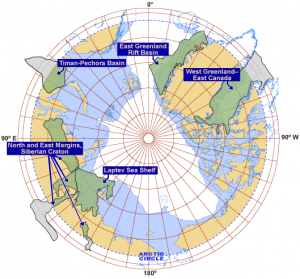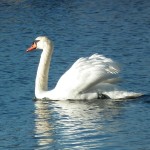Arctic Circle
The Arctic Circle environment is unique due to the proximity to the extreme cold of the North Pole, the weather within the Arctic varies some according to the seasons but in contrast to the equator region of the planet sphere the sub-zero temperatures are surprisingly far more extreme. The polar region is mostly covered with ice and permafrost, there is only some partial tree cover and protection on the rim of the Arctic Circle, and inside the proper polar region it is entirely treeless. Which makes it more vulnerable and subjected to rapid climate changes, the cap is held together by frozen ice and snow cover.
VIDEO.
Arctic water source
The Arctic freshwater source is believed to be in the Northern Hemisphere region that is most susceptible to the effects of climate variability and change, and is expected to display a warming that is more than twice the global average, show decreases in snow cover and sea-ice extent, reveal further retreat of permafrost, glaciers, and ice-caps, and have increased inter-annual variability in weather conditions.
Changes in the Climate
Such significant changes/shifts in climatic regimes are expected to have far-reaching first- and second-order impacts on the hydrology and ecology of northern/Arctic freshwater systems by impacting the ability of rivers, lakes, and wetlands to maintain adequate stream flows, water levels and water quality for ecosystem sustainability.
Changing climate is expected to directly impact not only the magnitude and timing of freshwater fluxes but also a range of physical, chemical, and biological processes in northern aquatic ecosystems.
Predicting the future of the Arctic water source
It is difficult to project the effects changing the climate, and environmental factors will have on Arctic freshwater systems, partly due to a poor understanding of their interrelationships, and partly due to a paucity of long-term monitoring sites and integrated hydro-ecological research programs in the Arctic.
Arctic Freshwater Systems
In light of the need for better understanding of Arctic freshwater hydrology and ecology, through integrated multidisciplinary hydrological, climatologically, and ecological field studies and laboratory analyses, “Arctic Freshwater Systems: Hydrology and Ecology” (Co-Principal Investigators: Fred Wrona and Al Pietroniro) has the research priorities to: (i) improve our process-level understanding of Changing climate is expected to directly impact not only the magnitude and timing of freshwater fluxes but also a range of physical, biological and chemical processes in northern aquatic ecosystems.
Environmental factors
It is difficult to project the effects changing climate, and environmental factors will have on Arctic freshwater systems, partly due to a poor understanding of their interrelationships, and partly due to a paucity of long-term monitoring sites and integrated hydro-ecological research programs in the Arctic.
In light of the need for better understanding of Arctic freshwater hydrology and ecology, through integrated multidisciplinary hydrological, climatologically, and ecological field studies and laboratory analyses, “Arctic Freshwater Systems: Hydrology and Ecology” (Co-Principal Investigators: Fred Wrona and Al Pietroniro) has the research priorities to: (i) improve our process-level understanding of freshwater and nutrients flow, (ii) develop improved predictive models for freshwater and nutrient flux, (iii) develop a unique legacy database of freshwater biodiversity (structure and function) and related environmental information on freshwater ecosystems (lotic and lentic) in the Canadian Arctic, and (iv) develop and provide tools and capacity in northern communities for improved community-based monitoring and assessment of the status and trends of the health and integrity of freshwater ecosystems in Canada’s north.
Watch this video on Arctic Fresh Water.
The Arctic, why should anyone care?
What goes on in that part of the planet, where the eyes of the people are not watching? One reason is that there is a large volume of Arctic freshwater stored in the Arctic region. Symbolically and potentially the Arctic freshwater is much more valuable for humanity than crude oil, 11% of the world does not have an improved water source for their daily lives. That may be a weak argument for the corporations that are tunnel-visioned and are driven by financial profits, and they don’t give a crap about world poverty or the world water crises. They only care about their money pipeline into their bank account.
Well a good case study can be found in the Antarctic region, much can be learned from the history of the Antarctic, and it has become more of an International Science project than a quick fix economic rush for its hidden riches and resources in crude oil and mineral deposits. It is therefore not surprising that the question of a particular Arctic treaty has been raised since the nature of self-serving humanity is well documented by history.
But does the world need more raw materials, or should it just learn to be more efficient with what it has already produced, and set its default lifestyle standards in the Western World. For example, how much less would the world use if it gave up on the idea of using motor vehicles for recreational use when, at the same time there are health problems related to poor health, overweight, and obese peoples. Recreational driving on the weekends for many hours just for fun, other alternatives to be discovered instead of indulging in the recreational burning of fossil fuels, the invention of the wheel may be said to have been the most significant invention, so why not use push bikes for the weekend recreation. The problem of the fossil fuels used by transport vehicles and other vehicles is that they consume a ton of fuel, and they are relatively inefficient in what they give in return. Maybe the consuming world should stop, and think hard for a while, and count the cost, what is essential, what matters, does it make sense to continue consuming and producing at the current rate, which transports produce around the world and burns tons of fuel in the process.
Who would want to drill the Arctic region?
For most people, the idea of drilling natural resources from the Arctic region in the extreme climate would seem inconceivable, which raises the question has the world gone blind crazy, so desperate for crude oil that they won’t stop for anything. The petroleum exploration in the Arctic is technically more challenging than any other environment. But with the increases in technology and equipment, high oil prices, tunnel vision, and the global warming resulting in the melting of the glaciers are opening up new ideas in the petroleum industry for potential drilling and exploration of the Arctic region.
Companies Drilling the Arctic.
Canada: Extensive drilling was done in the Canadian Arctic during the 1970s and 1980s by such companies as Panarctic Oils Ltd., Petro Canada, and Dome Petroleum.
Russia: In June 2007, a group of Russian geologists returned from a six-week voyage on a nuclear icebreaker 50 Let Pobedy, the expedition called Arktika 2007. They had traveled to the Lomonosov Ridge, an underwater shelf in Russia’s remote and inhospitable eastern Arctic Ocean.
Greenland: Greenland is believed by some geologists to have some of the world’s most significant remaining oil resources.[10] Prospecting is taking place under the auspices of NUNAOIL, a partnership between the Greenland Home Rule Government and the Danish state. U.S. Geological Survey found in 2001 that the waters off north-eastern Greenland (north and south of the arctic circle) could contain up to 110 billion barrels (17×109 m3) of oil.
USA: Prudhoe Bay Oil Field on Alaska’s North Slope is the largest oil field in North America. The area was discovered on March 12, 1968, by Atlantic Richfield Company (ARCO) and is operated by BP; partners are ExxonMobil and ConocoPhillips Alaska.
Norway: Rosneft and Statoil made the Arctic exploration deal in May 2012. It is the third deal Rosneft has signed in the past month, after Arctic exploration agreements with Italy’s Eni and US giant Exxon Mobil.
http://en.wikipedia.org/wiki/Petroleum_exploration_in_the_Arctic

 Bloggers Guide To Arctic Finland 2020
Bloggers Guide To Arctic Finland 2020 New Book Out!
New Book Out! Travel Guide To Arctic Finland
Travel Guide To Arctic Finland Recent Posts
Recent Posts


Leave a Reply